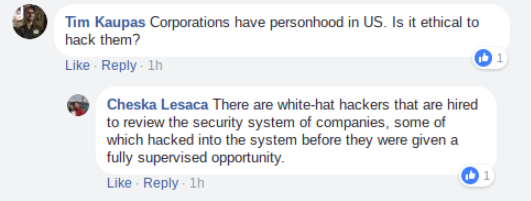So, Saudi Arabia granted a robot citizenship. That’s not the topic at hand, somehow. That’s just a thing that happened, because 2018 has every intention of one-upping 2017 in the “we all live in a SNL sketch parodying Black Mirror” surrealism sweepstakes.
The topic at hand is this: What happens if somebody hacks her?
When my boss dropped that question on Facebook, and I had to stop and stare at it for awhile. Geek hypotheticals are extremely my shizz, but seriously. There are layers on layers to that one.
Happily, some smart people are already unpacking the layers.
1. Does citizenship = Personhood?

“Corporations have personhood in US. Is it ethical to hack them?” – Tim Kaupas
“There are white-hat hackers that are hired to review the security system of companies, some of which hacked into the system before they were given a fully supervised opportunity.” – Cheska Lesaca
Tim’s point and Cheska’s reply highlight a complicated point of law. “Corporate personhood” is the controversial legal doctrine that corporations enjoy some of the same rights as individual citizens. It’s a big idea that has been at the heart of a lot of recent – and very contentious – law, including 2010’s Citizens United vs. FEC, which protected corporate political donations as a form of free speech, and 2014’s Burwell v. Hobby Lobby Stores Inc., which permitted corporations to make hiring and firing decisions on religious lines under the First Amendment.
To state the obvious, the First Amendment of the U.S. Constitution doesn’t say anything about corporations having the right to free anything. To state the even more obvious, it says nothing whatsoever about Saudi Arabia.
To state the less obvious, corporate personhood isn’t the same as personhood, period. It isn’t a legal absolute. It’s a heading, a way of characterizing a bunch of American law that defines the parameters of what corporations can and can’t do.
Also, as Cheska points out, corporations don’t act like people most of the time. When a hacker hacks a corporation, half the time they hire other hackers to deal with security! If you’ve ever found someone in a ski mask going through your undies, I’m going to guess you didn’t offer them a job.
So which is Sophia? A person, with rights to respect and personal autonomy worthy of zealous defense? Or a corporate resource a curious person can poke through the workings of without serious ethical or legal harm?
2. Is it alive?

“Gotta back up. No robot should have citizenship. Dogs are conscious, rats are conscious, birds are conscious, none of them have citizenship. A robot shouldn’t have citizenship. Answering the question validates an absurd position.” – Matthew Hager
Citizenship is special. It makes assumptions of citizens that Sophia, technically spiffy as she is, doesn’t seem capable of fulfilling.
Sophia herself, by way of her pleasant, only slightly-Stepford website, says she “can animate all kinds of human expressions,” but is “only starting to learn about the emotions behind those expressions.” That would seem to be a drawback in someone who wants to interact with the state.
That’s Matthew’s point, and it’s well-taken. Sophia is a machine. She does what she’s scripted to do. She lacks even the self-determination of an animal, and animals aren’t citizens.
That said, you’re not allowed to rewrite the brain of an animal, either. Citizen or otherwise, basic ethics requires a level of respect for the autonomy of other beings. So what constitutes “being?” Is there a point at which a self-optimizing algorithm is close enough to thought that it’s worthy of respect?
3. Getting real

“Nope. It’s hexual assault.” – John Steinmetz
OK, that’s a really niche joke. See, hexadecimal numbering is used in computer programming to… you know what? Don’t worry about it. If you don’t know what it is, just accept it’s a silly nerd joke and move on.
Less funny? Sophia is a Saudi citizen. Per the UN, there are roughly 15 million women and girls who are Saudi citizens. As of 2011, they even get to vote! As long as they have a male guardian’s permission, that is. Same deal if they want to travel. Or get jobs. Or go to school. Or open a bank account.
Point being, as previously mentioned, I love nerdy hypotheticals, and like any good ex-Catholic schoolboy, I’m thoroughly enthused at the chance to debate complex ethical questions. But “hypothetical” is exactly what Sophia is. She’s a charming publicity stunt, a marketing move by Hanson Robotics. Fair enough.
But when it comes to Saudi citizenship, I could give a damn about Sophia the pretty robot. The ethical questions to be answered are anything but hypothetical.
Hack that.
This story was originally featured on February 06, 2018.
Matt Salter is a writer and former fundraising and communications officer for nonprofit organizations, including Volunteers of America and PICO National Network. He’s excited to put his knowledge of fundraising, marketing, and all things digital to work for your reading enjoyment. When not writing about himself in the third person, Matt enjoys horror movies and tabletop gaming, and can usually be found somewhere in the DFW Metroplex with WiFi and a good all-day breakfast.













































Patrick
February 19, 2018 at 11:00 am
“Corporations have personhood in US.”
No they don’t. that’s an idiot repeating a political talking point that missed the truth.
People are persons. People don’t lose their rights just because they work together in organizational form, be it churches, labor unions, civic groups, political parties … or corporations.
So your free speech rights can’t be taken away just because you exercise them via a group. Otherwise, we could ban free speech for the Sierra Club and AFL-CIO.
that doesn’t make corporations *into* persons at all.
So the talking point has zero relevance into robots.